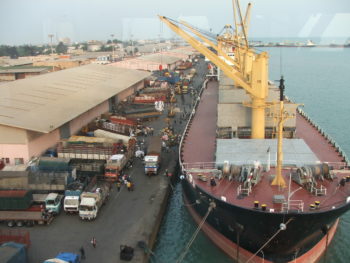
On the outskirts of Benin’s port city of Cotonou, thousands of used cars fill a vast parking lot but the merchants who used to come here from Nigeria to haggle for them are absent as recession bites at home.
Fréjus Fatondji works at one of dozens of car lots in the commune of Seme-Kpodji, wedged on a spit of land between Cotonou and the Nigerian border.
“There are no more Nigerian buyers, the car parks are full of merchandise, and mechanics, drivers, electricians, painters have all lost their jobs,” he said, gazing morosely over a row of second-hand cars imported from Europe.
At an adjacent lot, Tadjou Adejouma, vice president of a car import dealership, said that until last year they were selling 35,000 vehicles a month and now they barely sell 3,000.
Residents say drivers used to pass by in huge convoys, speeding towards the border, beeping their horns in celebration. Bars that sprang up to cater for visiting clients have closed and dozens of Lebanese, who dominate the import business in West Africa, have departed, residents say.
Benin is known as a “warehouse state” because it acts as a smuggling hub for goods bound for its larger, English-speaking neighbour Nigeria, Africa’s largest economy.
Import bans and high tariffs in protectionist Nigeria on everything from used cars to cigarettes have encouraged trade across the border with Benin, which maintains low tariffs on goods it imports.
But a recession in Nigeria which began last year, followed by the central bank’s decision to keep the naira at an artificially high rate, has choked off dollar supplies through official channels, forcing importers to pay a huge premium on the black market. This has driven up prices for goods paid for in West African CFA francs and crushed cross-border trade.
Amid growing signs of stagnation in Cotonou, from which 80 percent of the country’s imports were previously sent to Nigeria, some question whether Benin’s model of secretly re-exporting goods it has not produced is sustainable in a region which plans to remove anomalies in the tariff system that encourage smuggling.
An International Monetary Fund report in December said the slowdown in the Nigerian economy was having “significant impacts” on Benin, including a decline in customs revenue due to reduced imports since the Nigerian slump. “There are three factors at play in the decline: the recession in Nigeria, the naira devaluation and the increased effectiveness of Nigerian customs officials after some changes at the top introduced by (President Muhammadu) Buhari,” said Malte Liewerscheidt, Senior Africa Analyst at Verisk Maplecroft.
Benin’s finance ministry said it expected trade with Nigeria to pick up again this year and it is trying to encourage a return to a formal economy for regional commerce. Nigeria’s customs service said it will begin an “aggressive anti-smuggling operation” in April and encouraged people to pay outstanding customs duties on vehicles in the remaining grace period.
On the other side of the border, in the Nigerian town of Seme, 34-year-old Akowanu Ayoola Yusuf sits idle on the wall of a gas station, saying he has given up the increasingly costly and risky business of importing used cars from Benin.
“It’s not as plenty as it used to be before due to the exchange rate,” said Yusuf, speaking in Nigerian Pidgin.
Nearby, a family divides a bag of rice smuggled in from Benin into small containers to hide in different crannies of their car in the hope of outwitting officials along the 20 km drive back to Lagos.
UNOFFICIAL BUSINESS
Smuggling is big business, accounting for 20 percent of cotton-growing Benin’s GDP, according to the World Bank. But, on paper at least, there is little trace of the trade.
A former French colony where more than a third of people live in poverty, Benin records Nigeria-bound imports as being for domestic consumption, according to the IMF.
This has the advantage of concealing the scale of the business from Nigeria, which has accused Benin officials of undermining its laws. It also allows Benin to collect VAT and other fees on the imported goods.
Officials turn a blind eye to secret canal networks dug to ship goods across the lakes and lagoons of the border region, as well as the bribes sometimes paid to let them through, residents say. They do the same for cheap Nigerian fuel coming the other way, often ferried into Benin in jerrycans on small canoes.
In addition to the Lebanese merchants, the business is often conducted by Yorubas, an ethnic group from southwestern Nigeria and Benin that has been involved in cross-border trade since colonial times.
Countries in the 15-member West African regional bloc ECOWAS officially introduced common import tariffs in 2016, which should reduce opportunities for smuggling, although implementation has so far been patchy.
But in a sign of what may be to come, re-exports from Gambia to its larger neighbour Senegal fell sharply after Senegal cut import tariffs in 2000.
“We are hooked on a form of income that is not renewing itself,” said John Igué, director of a Cotonou-based think tank, who added that Benin should aim to produce more locally.
Still, Benin could remain an important transit country for landlocked neighbours Niger and Burkina Faso, especially if a long-stalled railway project to connect them is launched.